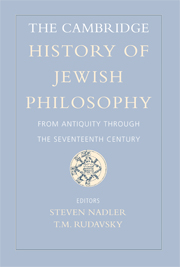Book contents
- Frontmatter
- Introduction
- 1 Texts and Contexts
- II Logic and Language
- III Natural Philosophy
- IV Epistemology and Psychology
- V Metaphysics and Philosophical Theology
- 17 God’s Existence and Attributes
- 18 Creation and Emanation
- 19 Theodicy and providence
- 20 Divine Omnipotence, Omniscience, and Human Freedom
- VI Practical Philosophy
- Biobibliographical Appendix
- Bibliography
- Index
- References
18 - Creation and Emanation
from V - Metaphysics and Philosophical Theology
Published online by Cambridge University Press: 28 May 2009
- Frontmatter
- Introduction
- 1 Texts and Contexts
- II Logic and Language
- III Natural Philosophy
- IV Epistemology and Psychology
- V Metaphysics and Philosophical Theology
- 17 God’s Existence and Attributes
- 18 Creation and Emanation
- 19 Theodicy and providence
- 20 Divine Omnipotence, Omniscience, and Human Freedom
- VI Practical Philosophy
- Biobibliographical Appendix
- Bibliography
- Index
- References
Summary
Consider the varied ways in which existence in general and human existence specifically are conceptualized – the colorful stories that support those conceptualizations, give them birth, or put flesh on their bare bones. For positivists existence is a given, raising no great questions about its being as it is. For theists existence is a given in a profoundly different sense, a gift that need not have been made. That nature is and how it is are marks of divine generosity. Hindus sometimes picture existence as an endless yet fleeting cycle. Buddhists may retort that the cycle of rebirths and sufferings mirrors and mocks the moral logic of our choices, and those of our former selves, a carousel of lives to be escaped only by dismounting, letting go. Heideggerians may speak of our throwness; existentialists, of forlornness, an inevitable consequence of our moral dilemma: forced to choose for all humanity, yet incompetent to make any such choice. For the Stoic, we (and all of nature) are not thrown but cast, assigned a role and a nesting series of responsibilities, to ourselves, our fellows, and nature at large. Creation is the narrative that situates humanity and nature at large among such options, making nature the sign and argument of the unseen: Goodness here bespeaks a larger goodness elsewhere. The energy and thought we admire are arguments, in monotheism, of a higher energy and deeper thought, pointing toward the Unconditioned.
- Type
- Chapter
- Information
- The Cambridge History of Jewish PhilosophyFrom Antiquity through the Seventeenth Century, pp. 599 - 618Publisher: Cambridge University PressPrint publication year: 2008
References
- 1
- Cited by

